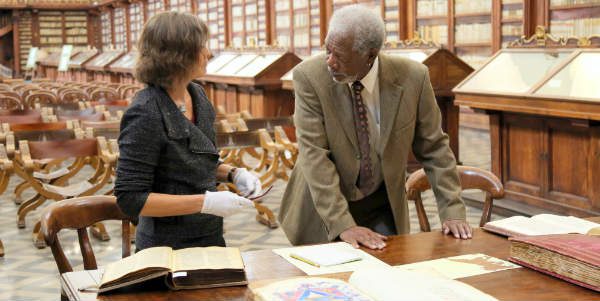A few years ago, the popular press had a fascination with predictions made by the ancient Maya — you know, those folks in Mesoamerica who liked to cut out the hearts of human sacrifices — that the world would end on Dec. 21, 2012.
Here’s how it’s explored in “Apocalypse,” the next episode of National Geographic Channel’s “The Story of God,” airing Sunday, April 10, at 9 p.m. ET/PT. It follows host Morgan Freeman on a trip around the world to survey how different religions deal with the Big Questions (click here for an earlier piece I did on the show).
Oh, well. It’s April 6, 2016, as I type this, and the so-called “Mayan apocalypse” went the way of most predictions of this sort, right down the memory hole.
On the other hand, you could say that it happened, only much earlier. Mayan civilization reached its zenith around the 300s A.D., but by the 900s, it had all but vanished. The people remained, but the distinctive world they had created faded into history, leaving behind bones, bits and stone monuments of itself.
Such it has been, with most human civilizations, and such it will likely be with ours, at some point.
Worlds end. New worlds begin. If the apocalypse is the end of the world, we’ve already seen scores of them.
As the famous R.E.M. song notes: “It’s the end of the world as we know it …”
People also end, and with each death goes a unique, irreplaceable view of reality. You might say that every human death is an apocalypse in miniature. It certainly is the end of the world, as he or she knows it, for the person who died.
But, Catholics believe, there is a world beyond the world, lasting into infinity. By virtue of our own choices, we will either spend it gazing upon the Beatific Vision of God (or on our way to that, in Purgatory), or cut off from it forever, in Hell.
One of the most famous notions of the Apocalypse — which comes from an Ancient Greek word for uncovering, as in the lifting of a veil — comes from the last book of the Bible, Revelation, a recounting of visions by the Apostle John during his exile on the island of Patmos.
Says the USCCB:
The Book of Revelation cannot be adequately understood except against the historical background that occasioned its writing. Like Daniel and other apocalypses, it was composed as resistance literature to meet a crisis. The book itself suggests that the crisis was ruthless persecution of the early church by the Roman authorities; the harlot Babylon symbolizes pagan Rome, the city on seven hills (Rev 17:9).
The book is, then, an exhortation and admonition to Christians of the first century to stand firm in the faith and to avoid compromise with paganism, despite the threat of adversity and martyrdom; they are to await patiently the fulfillment of God’s mighty promises. The triumph of God in the world of men and women remains a mystery, to be accepted in faith and longed for in hope. It is a triumph that unfolded in the history of Jesus of Nazareth and continues to unfold in the history of the individual Christian who follows the way of the cross, even, if necessary, to a martyr’s death.
Though the perspective is eschatological—ultimate salvation and victory are said to take place at the end of the present age when Christ will come in glory at the parousia—the book presents the decisive struggle of Christ and his followers against Satan and his cohorts as already over. Christ’s overwhelming defeat of the kingdom of Satan ushered in the everlasting reign of God (Rev 11:15; 12:10). Even the forces of evil unwittingly carry out the divine plan (Rev 17:17), for God is the sovereign Lord of history.
There are those who say, cloaked within Revelation’s rich symbolic language, it describes the fall of Jerusalem in 70 A.D. — certainly the end of the world, as Jews of the area knew it — and the rise of the Roman Emperor Nero, who cruelly persecuted Christians.
But as with many things in the Bible, what was relevant and timely then continues to be so today, as people often fight the same battles over and over, with only the names, places and dates changed.
Due to its extravagant, poetical nature and resonant themes of good and evil, Revelation is a favorite of Hollywood filmmakers. They’re helped by some non-Catholic Christians that have spun out stories around such notions as “The Rapture,” when all the true believers are swept up into Heaven, leaving behind the rest of humanity to deal with terrible tribulations (which we seem to have now anyway).
This murk has spawned any number of doomsday cults and prophets, who wind up looking at the dawn after the last day, and retreating to redo their predictions (if they didn’t do something appallingly foolish, like commit suicide, which is the ultimate self-fulfilling prophecy of death).
As with many things, Catholics have a both/and view of the Apocalypse, echoed in the remainder of that R.E.M. lyric:
It’s the end of the world as we know it, and I feel fine …
The Apocalypse is both inevitable and inspirational.
In a strictly scientific sense, each of us will end, the planet will end, the solar system will end, and the universe will end. It’s only a matter of time.
In a Christian view, Christ will return in His glory, either at the end of all things or at an earlier time of His own choosing. If any of us is around at the moment, it’ll be a heckuva show. But if we keep the Faith, no matter how it all comes out or when, we’ll wind up in a world that never ends.
So, basically, you’ll know the end when it happens, either to just you or to everything. In the meantime, all you can do is … all you can do.
Said Saint Peter, the first Vicar of Christ, and the Rock upon which Christ’s Pilgrim Church is built:
“But do not ignore this one fact, beloved, that with the Lord one day is as a thousand years, and a thousand years as one day. The Lord is not slow about His promise as some count slowness, but is forbearing toward you, not wishing that any should perish, but that all should reach repentance …
Since all these things are thus to be dissolved, what sort of persons ought you to be in lives of holiness and godliness, waiting for and hastening the coming of the day of God, because of which the heavens will be kindled and dissolved, and the elements will melt with fire! But according to His promise, we wait for new heavens and a new earth, in which righteousness dwells.
Therefore, beloved, since you wait for these, be zealous to be found by Him without spot or blemish, and at peace” (2 Pet. 3:8–14).
So, live every day you are given, and believe as if the world will end in a moment, so that you may have life for all eternity.
Image: ROME – Host Morgan Freeman examines ancient documents with Cornell University Professor of Ancient Mediterranean Religions Kim Haines-Eitzen at the Biblioteca Casanatense in Rome, Italy. (photo credit: National Geographic Channels/Seth Nejame)














